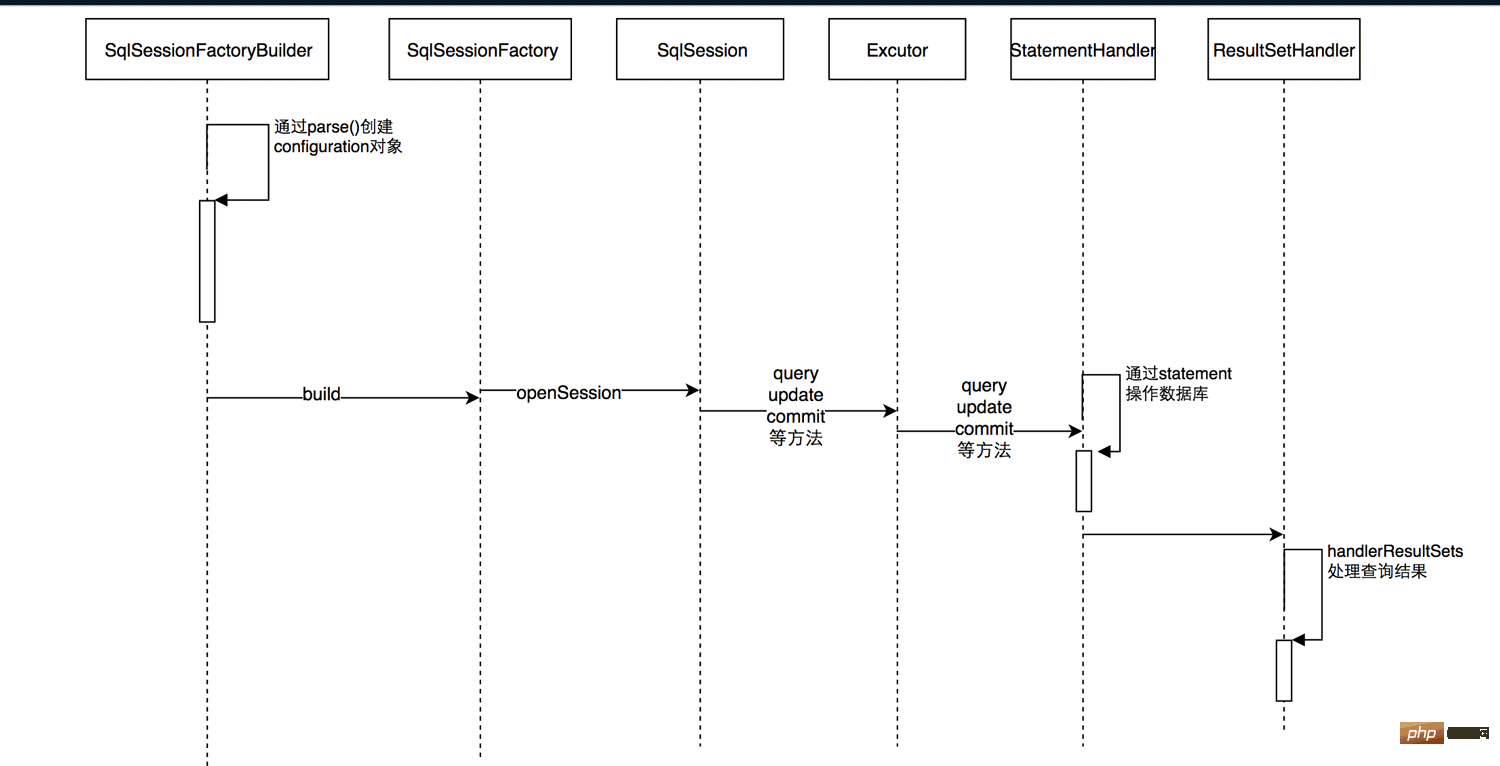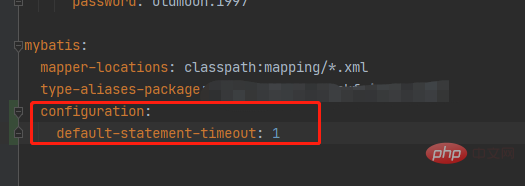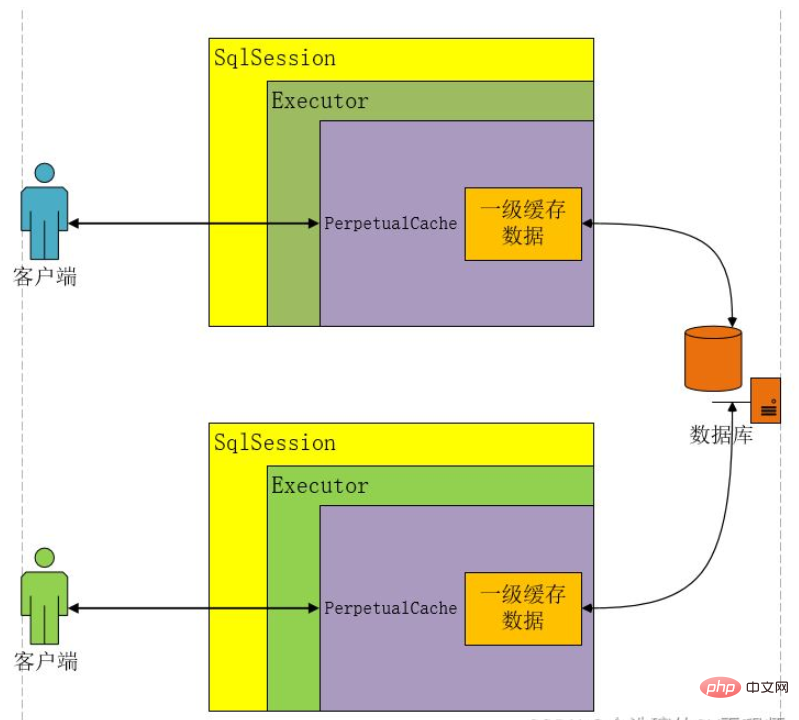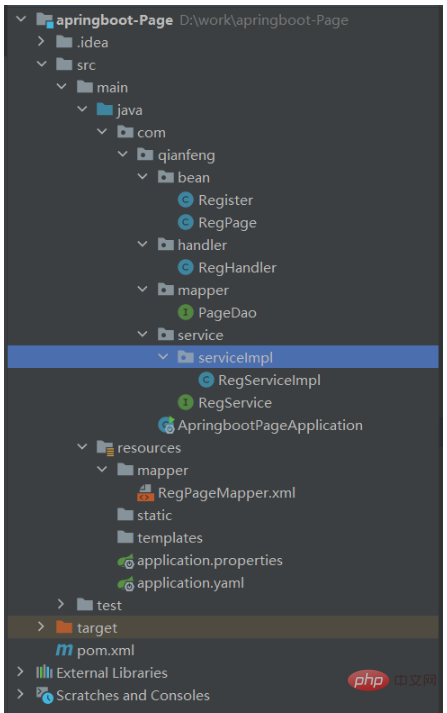
Explore the atypical writing methods of MyBatis
With the continuous evolution of Java development, MyBatis, as a classic ORM framework, is also constantly updated and optimized. In addition to the common basic usage methods, MyBatis also provides some atypical writing methods to use it more flexibly and efficiently. This article will explore some atypical MyBatis writing methods and provide specific code examples.
- Flexible use of dynamic SQL
Dynamic SQL is a major feature of MyBatis, which can automatically generate different SQL statements based on different conditions. Common usages include using dynamic tags <if></if>, <choose></choose>, <when></when>, <otherwise></otherwise> , <trim></trim>, <foreach></foreach>, etc., but in some cases, the traditional dynamic SQL writing method may not be flexible enough. At this time, you can use the <bind></bind> tag provided by MyBatis to splice the query conditions and SQL into a variable, and then use the where keyword to assemble the conditional statement.
<select id="getUserList" resultType="User">
<bind name="where" value="">
<if test="name != null">
<bind name="where" value="${where} AND name = #{name}" />
</if>
<if test="age != null">
<bind name="where" value="${where} AND age = #{age}" />
</if>
</bind>
SELECT * FROM user WHERE 1=1
<where>${where}</where>
</select>By using the <bind></bind> tag, we can more easily splice different query conditions and reduce repeated code. At the same time, using the <where></where> tag can automatically remove the where keyword when there are no query conditions.
- Custom type processor
MyBatis provides some common type processors by default for converting Java objects and database fields to each other. But in actual applications, we may encounter some uncommon data types, and then we need a custom type processor to handle these data types. A custom type handler can inherit org.apache.ibatis.type.BaseTypeHandler or implement the org.apache.ibatis.type.TypeHandler interface. In addition to handling uncommon data types, we can also use custom type processors to handle special data conversion needs, such as converting numeric fields in the database into enumerated types.
public class EnumTypeHandler<E extends Enum<E>> extends BaseTypeHandler<E> {
private Class<E> type;
public EnumTypeHandler(Class<E> type) {
if (type == null) {
throw new IllegalArgumentException("Type argument cannot be null");
}
this.type = type;
}
@Override
public void setNonNullParameter(PreparedStatement ps, int i, E parameter, JdbcType jdbcType) throws SQLException {
ps.setInt(i, parameter.ordinal());
}
@Override
public E getNullableResult(ResultSet rs, String columnName) throws SQLException {
int ordinal = rs.getInt(columnName);
return rs.wasNull() ? null : convert(ordinal);
}
private E convert(int ordinal) {
E[] enums = type.getEnumConstants();
for (E e : enums) {
if (e.ordinal() == ordinal) {
return e;
}
}
return null;
}
}Through custom type processors, we can flexibly handle different data type conversion logic according to actual needs, making processing complex data simpler and more efficient.
- Use annotations to simplify mapping configuration
Traditional MyBatis mapping configuration needs to be configured through XML files, but MyBatis also provides annotations to simplify the mapping configuration process. By using annotations, we can perform mapping configuration directly on the entity class without writing a large number of XML configuration files.
public interface UserMapper {
@Select("SELECT * FROM user WHERE id = #{id}")
User getUserById(int id);
@Insert("INSERT INTO user(name, age) VALUES(#{name}, #{age})")
@Options(useGeneratedKeys = true, keyProperty = "id")
int insertUser(User user);
@Delete("DELETE FROM user WHERE id = #{id}")
int deleteUser(int id);
@Update("UPDATE user SET name = #{name}, age = #{age} WHERE id = #{id}")
int updateUser(User user);
}By adding corresponding annotations to the method, we can directly write SQL statements and avoid cumbersome XML configuration files. At the same time, by using the @Options annotation, we can also specify the way to automatically generate the primary key.
Summary:
As an excellent ORM framework, MyBatis not only provides common usage methods, but also some atypical writing methods, allowing it to be used more flexibly and efficiently. This article explores three atypical MyBatis writing methods, including the flexible use of dynamic SQL, custom type processors, and the use of annotations to simplify mapping configuration, and provides specific code examples. By giving full play to the characteristics of MyBatis, we can better respond to actual development needs and improve development efficiency and code quality.
(Note: This article is only for exploring the atypical writing methods of MyBatis. The specific code examples are for reference only. Developers need to make appropriate adjustments according to specific needs in actual applications.)
The above is the detailed content of Discover unique uses of MyBatis. For more information, please follow other related articles on the PHP Chinese website!
 Java之Mybatis的二级缓存怎么使用May 24, 2023 pm 06:16 PM
Java之Mybatis的二级缓存怎么使用May 24, 2023 pm 06:16 PM缓存的概述和分类概述缓存就是一块内存空间.保存临时数据为什么使用缓存将数据源(数据库或者文件)中的数据读取出来存放到缓存中,再次获取的时候,直接从缓存中获取,可以减少和数据库交互的次数,这样可以提升程序的性能!缓存的适用情况适用于缓存的:经常查询但不经常修改的(eg:省市,类别数据),数据的正确与否对最终结果影响不大的不适用缓存的:经常改变的数据,敏感数据(例如:股市的牌价,银行的汇率,银行卡里面的钱)等等MyBatis缓存类别一级缓存:它是sqlSession对象的缓存,自带的(不需要配置)不
 怎么使用springboot+mybatis拦截器实现水平分表May 14, 2023 pm 06:43 PM
怎么使用springboot+mybatis拦截器实现水平分表May 14, 2023 pm 06:43 PMMyBatis允许使用插件来拦截的方法Executor(update,query,flushStatements,commit,rollback,getTransaction,close,isClosed)ParameterHandler(getParameterObject,setParameters)ResultSetHandler(handleResultSets,handleOutputParameters)StatementHandler(prepare,parameterize,ba
 mybatis分页的几种方式Jan 04, 2023 pm 04:23 PM
mybatis分页的几种方式Jan 04, 2023 pm 04:23 PMmybatis分页的方式:1、借助数组进行分页,首先查询出全部数据,然后再list中截取需要的部分。2、借助Sql语句进行分页,在sql语句后面添加limit分页语句即可。3、利用拦截器分页,通过拦截器给sql语句末尾加上limit语句来分页查询。4、利用RowBounds实现分页,需要一次获取所有符合条件的数据,然后在内存中对大数据进行操作即可实现分页效果。
 怎么用springboot+mybatis plus实现树形结构查询May 21, 2023 pm 05:01 PM
怎么用springboot+mybatis plus实现树形结构查询May 21, 2023 pm 05:01 PM背景实际开发过程中经常需要查询节点树,根据指定节点获取子节点列表,以下记录了获取节点树的操作,以备不时之需。使用场景可以用于系统部门组织机构、商品分类、城市关系等带有层级关系的数据结构;设计思路递归模型即根节点、枝干节点、叶子节点,数据模型如下:idcodenameparent_code110000电脑0220000手机0310001联想笔记本10000410002惠普笔记本1000051000101联想拯救者1000161000102联想小新系列10001实现代码表结构CREATETABLE`
 springboot配置mybatis的sql执行超时时间怎么解决May 15, 2023 pm 06:10 PM
springboot配置mybatis的sql执行超时时间怎么解决May 15, 2023 pm 06:10 PM当某些sql因为不知名原因堵塞时,为了不影响后台服务运行,想要给sql增加执行时间限制,超时后就抛异常,保证后台线程不会因为sql堵塞而堵塞。一、yml全局配置单数据源可以,多数据源时会失效二、java配置类配置成功抛出超时异常。importcom.alibaba.druid.pool.DruidDataSource;importcom.alibaba.druid.spring.boot.autoconfigure.DruidDataSourceBuilder;importorg.apache.
 springboot怎么整合mybatis分页拦截器May 13, 2023 pm 04:31 PM
springboot怎么整合mybatis分页拦截器May 13, 2023 pm 04:31 PM简介今天开发时想将自己写好的代码拿来优化,因为不想在开发服弄,怕搞坏了到时候GIT到生产服一大堆问题,然后把它分离到我轮子(工具)项目上,最后运行后发现我获取List的时候很卡至少10秒,我惊了平时也就我的正常版本是800ms左右(不要看它很久,因为数据量很大,也很正常。),前提是我也知道很慢,就等的确需要优化时,我在放出我优化的plus版本,回到10秒哪里,最开始我刚刚接到这个app项目时,在我用PageHelper.startPage(page,num);(分页),还没等查到的数据封装(Pa
 Java Mybatis一级缓存和二级缓存是什么Apr 25, 2023 pm 02:10 PM
Java Mybatis一级缓存和二级缓存是什么Apr 25, 2023 pm 02:10 PM一、什么是缓存缓存是内存当中一块存储数据的区域,目的是提高查询效率。MyBatis会将查询结果存储在缓存当中,当下次执行相同的SQL时不访问数据库,而是直接从缓存中获取结果,从而减少服务器的压力。什么是缓存?存在于内存中的一块数据。缓存有什么作用?减少程序和数据库的交互,提高查询效率,降低服务器和数据库的压力。什么样的数据使用缓存?经常查询但不常改变的,改变后对结果影响不大的数据。MyBatis缓存分为哪几类?一级缓存和二级缓存如何判断两次Sql是相同的?查询的Sql语句相同传递的参数值相同对结
 PageHelper在springboot+mybatis框架中如何使用May 12, 2023 pm 03:55 PM
PageHelper在springboot+mybatis框架中如何使用May 12, 2023 pm 03:55 PM一、思路将分页所需的内容都放到一个实体类中分页数据所需要的实体类!内包含页码,页大小,总条数,总页数,起始行pagehelpr提供了这个类pageInfo,不需要我们自己创建二、主要逻辑select*from表名limit起始行,展示几条数据#第n页每页展示五条数据select*from表名limit(n-1)*5,5#每页展示多少条pageSize3#总共有多少条totalselectcount(*)from表名#总页数pagespages=total%pagesSize==0?total/p


Hot AI Tools

Undresser.AI Undress
AI-powered app for creating realistic nude photos

AI Clothes Remover
Online AI tool for removing clothes from photos.

Undress AI Tool
Undress images for free

Clothoff.io
AI clothes remover

AI Hentai Generator
Generate AI Hentai for free.

Hot Article

Hot Tools

SublimeText3 Mac version
God-level code editing software (SublimeText3)

Dreamweaver CS6
Visual web development tools

ZendStudio 13.5.1 Mac
Powerful PHP integrated development environment

Safe Exam Browser
Safe Exam Browser is a secure browser environment for taking online exams securely. This software turns any computer into a secure workstation. It controls access to any utility and prevents students from using unauthorized resources.

PhpStorm Mac version
The latest (2018.2.1) professional PHP integrated development tool






